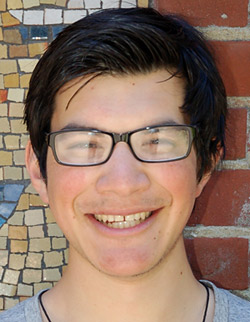Jesús Galindo: Brothers’ bond inspires budding teacher
When Galindo was 9, his father, an elementary school drop-out, divorced his mother, and she fell into deep depression. The family had been troubled, poor. From that moment on, Galindo and his younger brother Alex, began a series of moves with their mom to 13 California cities.

May 16, 2013

Jesús Galindo (Jean Smith photo)
“A horrible student.” That’s how UC Berkeley senior Jesús Galindo remembers himself in elementary school. “For teachers,” he said, “I was the kid to watch out for. I’d act up a lot, or go into a corner and do nothing.”
When Galindo was 9, his father, an elementary school drop-out, divorced his mother, and she fell into deep depression. The family had been troubled, poor. From that moment on, Galindo and his younger brother Alex, began a series of moves with their mom to 13 California cities.
“There was no time for homework; we were in a constant struggle for food and money to survive,” said Galindo. His mother eventually took the boys to Tijuana, Mexico, when Galindo was 11. Then, he said, she disappeared, leaving them on their own.
This spring, 22-year-old Galindo – the first in his family to finish high school – graduates from UC Berkeley with a double major in political science and statistics. In the fall, he will be a teacher in Richmond as part of Teach for America. Someday, he said, he plans to be a school administrator or education policy scholar and to “reform how public schools are funded in the United States.”
How his life has turned out is nothing short of amazing, and a testament to perseverance and brotherly love. Even more astounding is that Galindo and his brother have been their own family unit – and an inseparable support system – for most of their young lives. Today, they still share a roof, in the Bay Area.
“As long as I was alive and breathing, I didn’t want to let go of my brother,” who suffered mental health issues as a teen, said Galindo. “His well-being is my priority – over academia, over my success. And he understands me, what we’ve been through, and we’ve always worked in solidarity together.”
Back in Tijuana, young Jesús Galindo worked for 50 cents a day in an auto shop to pay for Alex’s schooling, as education in Mexico was not free. He never forgot his mother’s words, “No matter what you’re doing in life, make sure you’re getting an education.” Alex’s cheerful personality kept his older brother going.
“Regardless of all these adversities, he was always the positive one,” said Galindo. “We’d be starving, and he always had hope. He said eventually we’d eat and get out of there.”
But the only one who left Tijuana was Galindo. His father came to get him, but left Alex, his youngest son, behind and in a rough neighborhood with uncles unable to care for him. Galindo was driven to Central California, where the dad had a new wife and baby. The family had a large house in Los Banos, and needed the boy’s help with chores, and his English-speaking skills.
“But every waking minute, I thought about my brother and what he was doing,” said Galindo. “Was he eating? Going to school? I didn’t feel comfortable there. I needed my brother.” Galindo attended middle school, but “did horribly, got Fs,” he said. “My mind was somewhere else.”
Years passed before Alex was brought to California from Mexico at age 9. “It was one of the happiest moments of my life,” said Galindo, “but my brother, whose nickname had been ‘happy,’ was no longer the same.”
To be a good role model for Alex, Galindo, then 13, began improving his grades from poor to almost perfect. In high school, he took honors classes. He started a business that created business cards and flyers in order to pay for his clothes, school supplies and to take his brother to the movies. He became president of school clubs and ran a cancer fundraising event. Admiring teachers steered him toward colleges and scholarships.
“For some reason, I had UC Berkeley in my heart,” he said. “I fell in love with how it was described, with all the activism. I listened to Mario Savio’s story to pump myself up.” On the day he could check email for acceptance to Berkeley, he and his brother walked to school. They had no computer of their own. In the computer lab, Galindo was too scared to look and put his head down.
“Alex started reading my email and grabbed my hand and started shaking, and he was like, ‘You made it, we made it. Despite everything we’ve been through, our dreams are coming true.’ He was really happy for me. He started crying, I started crying. We celebrated with ice cream and a Monster energy drink and Chinese food.”
Their joy turned to sadness as Galindo packed for college. Later, at UC Berkeley, Galindo learned his brother’s mental and physical health was suffering. He purchased a bus ticket, brought Alex to Berkeley, and paid for medical exams. Later, after Alex graduated from high school in Los Banos, he moved into his brother’s tiny Oakland apartment.
“We’ve had our ups and downs, and suffered financially, I’m not going to lie,” said Galindo, “but my brother is regaining his happy personality, becoming more independent.”
Galindo blossomed academically and in community service, winning a 2012 Peter E. Haas Public Service Award. On campus, he led voter registration efforts and helped introduce 100 percent sustainable “green books,” used in place of blue exam books. On a winter break, he organized efforts to rid his Aptos, Calif., church of lead paint, which was causing illness in the community.
His decision to become an educator stems from high school and college teachers who listened and suggested resources when he needed them. “At Berkeley, professors have the opportunity to make more money at private schools, but many told me they’d rather stay here because they believe in the public good,” he said. “Many Berkeley students are from very difficult backgrounds, but when our teachers help us, we all succeed together.”
Ethnic studies instructor Diane Pearson, one of Galindo’s teachers and a sponsor for several of his projects, said Galindo is “one of the best and brightest to come through Cal. He’s the reason we teach, and is incredibly important to our future as a state, nation and peoplehood.”
After graduation, and his Teach for America training this summer in Los Angeles, Galindo plans to rent a small house in Richmond, near the school where he will work, and to get the dog he and Alex, now a community college student, have always wanted. “Alex is really happy about that,” said Galindo. “And he’s really proud of me.”